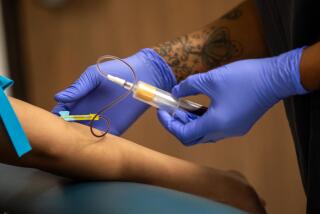Controversial Home AIDS Test: Why It’s Needed : On balance it could help retard the spread of the epidemic
- Share via
No further delay can be tolerated in gaining the upper hand against the AIDS epidemic. This terrible disease has already claimed nearly a quarter of a million American lives. Astonishingly, as many as 100,000 people annually still contract the HIV virus that causes AIDS, even though its transmission is now quite preventable in most cases.
A potentially potent new tool in stopping the spread of the virus is the home HIV test kit. It would allow people to draw blood at home, mail it in anonymously to a laboratory and get the results and counseling by phone. A groundswell of support for these tests is building among AIDS specialists, gay groups and other interests, including the NAACP. The Food and Drug Administration, originally chary, is expected to approve general marketing of home tests within a month or two. We strongly support that, as long as the FDA imposes strict controls to prevent misuse and to ensure that those testing positive get proper support and counseling. All involved agree that the AIDS test is now so reliable that the problem of false negatives and positives is minimal. The chief objection comes from the National Alliance of Lesbian and Gay Health Clinics, whose leaders argue that counseling in clinics and doctors’s offices is essential to prevent suicides if the test is positive, and to bring the person into treatment.
This concern cannot be dismissed lightly, and those clinics have done heroic work. But the fact is that 85% of Americans have not been tested, nor have the majority of those most at risk, according to the Centers for Disease Control. A major barrier to testing is fear or embarrassment at appearing at a public clinic or medical office to give a blood sample. In more remote areas, hostility and ignorance among local physicians is a further deterrent. Moreover, studies show that most people do not now get any counseling at all after the test.
The proposed home test would cost about $35 at drug stores. It includes equipment to draw a few drops of blood, which are placed on several circles, smaller than a dime, on blotter paper. The sample is mailed, prepaid and anonymously, to a laboratory. Using an identification number, the purchaser later telephones toll-free for the results--and counseling and referrals if positive. Proponents argue that most people are more comfortable discussing such sensitive matters with the stranger on the telephone than in person.
While there is no cure for AIDS, there are treatments that prolong life. Moreover, those who test positive can take precautions against spreading the virus. Some fear excessive testing, but for now the problem is inadequate testing. The most obvious candidates are sexually active homosexuals, intravenous drug users and recipients of transfusions. The risk drops after that, but many experts urge all sexually active men and women to get tested, particularly if they believe a partner falls into a high-risk group. Also, pregnant women should be tested routinely, because drugs can prevent transmission of the virus to the fetus.
In approving the home test, the FDA faces many tough questions: Can it assure both anonymity and timely counseling? Can it prevent employers or relatives from coercing people into taking the test and disclosing results? How many languages must the accompanying literature be printed in? What are the implications of bypassing doctors and other health professionals? Will the test really reduce risky behavior, or have the opposite effect?
In all this, it is important not to let economic factors overcome medical ones. The kit manufacturers, the largest being Johnson & Johnson, have an obvious economic interest. So do the clinics, who fear being squeezed out. The FDA should try to ensure the survival of clinics like the Gay and Lesbian Community Services Center here in Los Angeles, which has been particularly effective in bringing AIDS education, testing and care to immigrant communities that the self test is unlikely to penetrate.
The AIDS home test raises many difficult problems. But in our view, as the AIDS scourge marches on, the benefits far outweigh the risks.
More to Read
Sign up for Essential California
The most important California stories and recommendations in your inbox every morning.
You may occasionally receive promotional content from the Los Angeles Times.










